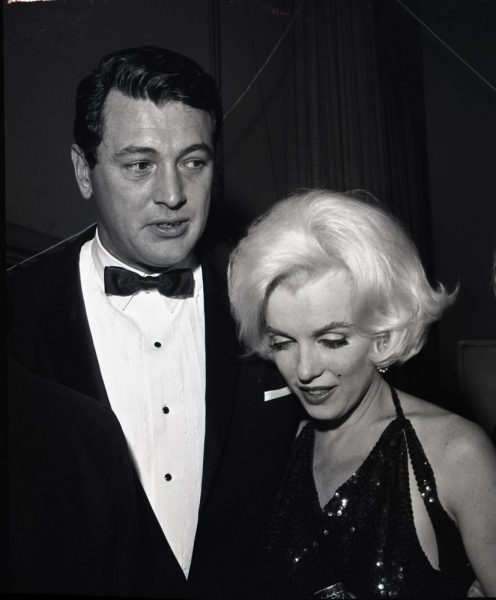
In some ways, Rock Hudson was Marilyn’s male counterpart as a misunderstood sex symbol of 1950s Hollywood. They partied together at the How to Marry a Millionaire premiere in 1953, and in 1962 Rock would present Marilyn with her final award at the Golden Globes. Sadly they never worked together, but Rock was the initial favourite for her leading man in Bus Stop; and in 1958, she was considered for Pillow Talk before deciding to make Some Like It Hot instead. (Doris Day got the part, the beginning of a great comedy partnership with Rock.)
Until now, it has been unclear how well the two stars knew each other (although a recent hack tome made the unlikely claim that Marilyn and Rock were lovers – as we now know, Hudson was gay.) In a critically praised new biography, All That Heaven Allows, author Mark Griffin draws on interviews with Rock’s secretary, Lois Rupert, who claims they often spoke on the phone. Although the frequency of their conversations may be questioned, the obvious affection of their Golden Globes photos combined with this information could suggest that Rock was one of the few Hollywood figures trusted by Marilyn in her final months – and Griffin also reveals that Hudson generously donated his fee for narrating the 1963 documentary, Marilyn, to a cause very close to her heart.
“It was while he was on location for A Gathering Of Eagles that Rock received word that a friend had died. As Lois Rupert recalled, ‘Rock met me at his front door with the news … “Monroe is dead” is all he said.’
Only five months earlier, Rock and Marilyn Monroe had posed for photographers at the annual Golden Globes ceremonies. In images captured of the event, Monroe, who was named World Film Favourite, is beaming as Hudson enfolds her into a protective embrace. With a shared history of abuse and exploitation, it was inevitable that these two should be drawn to each other. Recognising that he posed no sexual threat to her, Monroe had latched on to Hudson and had lobbied for Rock to co-star with her in Let’s Make Love as well as her uncompleted final film, Something’s Got to Give.
Lois Rupert remembered that in the early 1960s, Rock regularly received late-night distress calls from Monroe as well as another troubled superstar. ‘If it wasn’t Marilyn Monroe crying on his shoulder, then it was Judy Garland,’ Rupert recalled. ‘It was almost like they took turns. Marilyn would call one night and Judy the next. He was always very patient, very understanding with both of them, even though he wasn’t getting much sleep. I think he liked playing the big brother who comes to the rescue.’
Within ten months of Monroe’s death, 20th Century-Fox would release a hastily assembled documentary entitled Marilyn. Fox had initially approached Frank Sinatra about narrating, but when the studio wasn’t able to come to terms with the singer Hudson stepped in. Hudson not only provided poignant commentary – both on and off camera – he donated his salary to help establish the Marilyn Monroe Memorial Fund at the Actors Studio.”